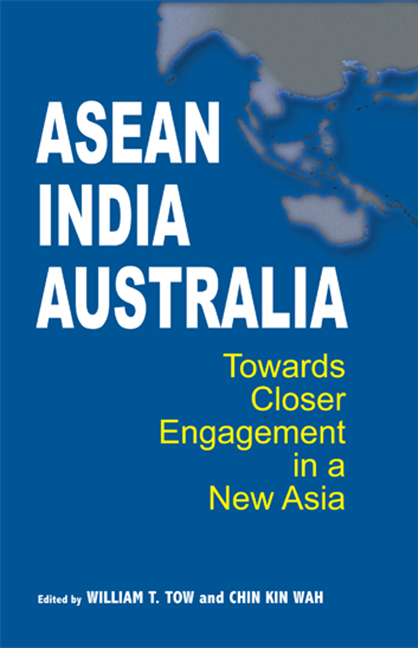Book contents
- Frontmatter
- Contents
- Preface
- Contributors
- List of Abbreviations
- Introduction
- Part I Emerging Regional Security
- Part II Energy Security
- Part III Climate Change
- Part IV Maritime Security
- 11 Australia and Maritime Security in the Northeast Indian Ocean
- 12 ASEAN Maritime Security Perspectives: Enduring Partnerships
- 13 Maritime Security Triangulation of ASEAN-Australia-India: An Indian Perspective
- 14 Governance in Australian Discourse
- 15 ASEAN Charter and Perspectives of Governance and Democracy in Asia
- 16 The Problem of Governance in India
- Part V Law Enforcement/Combating International Crime
- Conclusion
- Bibliography
- Index
13 - Maritime Security Triangulation of ASEAN-Australia-India: An Indian Perspective
from Part IV - Maritime Security
Published online by Cambridge University Press: 21 October 2015
- Frontmatter
- Contents
- Preface
- Contributors
- List of Abbreviations
- Introduction
- Part I Emerging Regional Security
- Part II Energy Security
- Part III Climate Change
- Part IV Maritime Security
- 11 Australia and Maritime Security in the Northeast Indian Ocean
- 12 ASEAN Maritime Security Perspectives: Enduring Partnerships
- 13 Maritime Security Triangulation of ASEAN-Australia-India: An Indian Perspective
- 14 Governance in Australian Discourse
- 15 ASEAN Charter and Perspectives of Governance and Democracy in Asia
- 16 The Problem of Governance in India
- Part V Law Enforcement/Combating International Crime
- Conclusion
- Bibliography
- Index
Summary
The twenty-first century had commenced with a paradoxical dichotomy of a promise and a peril. The promise has been the optimal vision of economic interdependence through the vistas of globalization and the peril has been the perennial scourge of asymmetric conflicts that has gravely weakened state security and human security in all its essence. Maritime security has emerged as the single most important issue of security due to the paradoxical dichotomy of globalization and asymmetric conflicts. Globalization and economic growth have been largely predicated on the maritime-based trade and supply chains that have knit the globe effectively with maritime transportation. However, this maritime-based global network has been rendered vulnerable, both on land and at sea, due to the threats and challenges of asymmetric violent groups that have emerged as a single perilous threat.
Maritime security has the potential for a new synergy in networking economies and markets, and for building new capacities for cooperative and convergent security among states. Having to contend with the peril of asymmetric threats and the challenge of transnational threats, states have been induced to converge to build new capacities and capabilities to address the challenge.
The Asia-Pacific is a wide theatre of the Asian littoral that abounds with enormous promise of economic growth. It is hedged by the Indian and Pacific Oceans that have emerged in geo-economic and geostrategic significance given the high density of shipping and trade routes. Southeast Asia, Australia, and India are littorals that occupy a diagonal axis across the Indo-Pacific Oceans with immense economic and strategic implications. The three littorals represent a very significant share of the geo-economic growth and development second only to the Chinese-Japanese-Korean littorals in East and Northeast Asia.
A perspective of the Regional Security Complex theory could help in the understanding of how security architectures of the triangulation of the three littorals could be defined. The imperatives of maritime security are shaped by respective geostrategic perspectives: inherent security predicaments, emergent geo-economic challenges, and the task of contending asymmetric and transnational challenges.
- Type
- Chapter
- Information
- ASEAN-India-AustraliaTowards Closer Engagement in a New Asia, pp. 219 - 242Publisher: ISEAS–Yusof Ishak InstitutePrint publication year: 2009



